T1D Parenting Study Messages Received by Group
Michigan State University
Bree E. Holtz (bholtz@msu.edu) & Katie Mitchell (kmitch@msu.edu)
Click Here to Download the Parenting Messages
Group 1: Messages were related to general parenting and received through Facebook
- Try dwelling on positives this week for 5-15 seconds, try to appreciate the positives in your life & it will help you be more positive. Write one positive thing in your life each day. Share one thing you did with the group in the comments below!
- This week, write down your vision of your best self in a month, a year, and in 5 years. By simply envisioning success, you can increase your outlook on the future! Start with the end in mind. Share with the group what your vision of your best self is in a year.
- Try a healthier way to handle stress this week: Go for a walk, read a book, listen to music, get enough sleep, or do a favorite hobby. By actively coping with stress, you can prevent running out of fuel throughout the week. What do you do to handle stress? Share with the group.
- Thank three people, smile three times, write about one positive experience, exercise, meditate, do something nice for someone. What’s one positive experience you’ve had this week?
- Each night, write down 1-2 things that went well in your day, and ask yourself how did you make that happen? By observing more positives, it can alter your long-term happiness. Look for them, create them, and recall them. Share one thing that went well in your day today.
- By taking care of your own needs, you will be better able to respond & help your child. What are your favorite self-care tips?
- To be a good parent, you need to refuel sometimes. Take some “me-time” to do something you enjoy. Identify 1 or 2 activities you can do in a week that focuses on you and refueling your energy (reading, exercising, meditation) and share below.
- Next time you need your child to change a behavior immediately, the way you choose to interact with your child in the moment is often more important than the end result. For example, when we want our child to be quiet, snapping at them to be quite will not change their behavior long-term, instead, focus on the process of describing why you need a change. Describe a time that this has happened to you.
- What are some rituals you can incorporate into your child’s day? Maybe singing to them as they wake up? Maybe a lunch note? Do you have a fun family ritual that is part of your family’s daily life?
- Next time you get in a disagreement with your child, take three deep breaths and try responding in a more friendly tone. Fighting anger with anger usually leads to a lose-lose situation for you and your child. Share an example of a time when you successfully negotiated the disagreement.
- Dismissing feelings can happen frequently with busy parents. Telling children to “just get over it” is hurtful. Being open to your children’s emotions will help them feel more comfortable coming to you in times of need. This week, try to label your child’s emotion or ask them questions on how they are feeling next time they are upset. Report back on how it went.
- Involve your children in problems solving. Ask them what they believe is the best solution to a struggle or challenge. What problems have you and your child solved together recently and how did it go?
- When you show your child you are interested, they are more likely to open up to you later. For example, instead of asking kids, “How was school?,” just ask them specifically what they did today. What is your favorite question to ask your child after school?
- Many kids can’t explain why they misbehaved. Asking them “why” questions stresses them out & is rarely helpful. When your child gets in trouble, try to avoid Why questions, instead ask what is going on, try to label their emotion, and come up with a solution with them. Is there something that you do to try to get through this?
- Showing appreciation for small tasks your kids do can be hard during a busy day, but making time for this will help your kids feel better. Write a list of three things this week that you are thankful for, related to your kids. Tell them throughout the week some of the items on your list. What is one thing you were thankful for this week related to your kids?
- Surprise and delight may come in many forms for your child. Maybe an extra book before bed, or special snuggle time?
- Paying attention is a great way to convey love. With young kids hold and hug them. With older kids just listen to them. What is one way you pay attention to your child?
- Children are more likely to repeat good behavior when they know parents notice it & realize how proud parents are of them. Try to tell them throughout the week when they are doing behaviors that you approve of. Share how this experience went for you.
- Punishing is not always the answer when children misbehave. Using consequences instead of punishment can help shape children’s behaviors. Consequences help teach children to view how their choices impact their lives. Punishments might make your child hide these behaviors. What is an appropriate consequence to a child not getting up fast enough in the morning? How about: Rise and Shine, or get left behind! What are some other examples of consequences that you use is parenting?
- When your child comes to you & they are upset, express sympathy & then help them label their emotion before resolving the issue. By labeling emotions, your child will feel that these emotions are normal and be better able to process them. They are also more likely to behave better and may reduce conflict between you and them. How do you express sympathy when your child is upset?
- You want to be available for you child when they’re ready to tell you things. Placing a high level of importance on your child’s desire to chat about something gives them a better path to open communication and makes them more likely to share more details. What is one thing that your child openly shared with you this week?
- Problem solving is something that we do every day. However, it is definitely a skill that is learned. The teenage years are a time in human development where we can see this skill lacking, even in the smartest, most well-behaved, lovable kid. During this time, a huge transformation is taking place in the brain, which is a cause of rash decisions and actions by our children that leads us to wonder, “What was she thinking?!?!?” What is one area that you think could be addressed this way?
- Work/Life balance is difficult. Give yourself some simple guidelines to find balance, like no email on the weekends. What are some of the guidelines you follow for Work/Life balance?
Group 2: Messages were related to diabetes parenting and received through Facebook
- Wearing a bracelet or necklace that lets people know your child has diabetes can help save them in an emergency. Does your child wear a bracelet or necklace that tells people your child has diabetes? Share a photo of it with the group.
- Being a parent of a child with type 1 diabetes is a 24/7/365 job. Be sure to be kind to yourself. You’re doing great! When is the last time you took some “me time”? Share with the group your favorite “me time” activity.
- Your child might have a bad day and that’s okay. Let them know that you understand how hard it is to keep on it all the time. Remind them that tomorrow is a new day. *Call to action?
- Having a support group who understands being a parent of a child with diabetes can help you feel support and help answer questions. Are you in a support group? How has it helped you?
- It can be hard to find a reliable person to help take care of your child. Here is a resource that might help: http://myt1dhope.msu.edu/events/babysitters How have you found help?
- When you are feeling stressed about your child’s diabetes, take three deep breathes. It’s normal to feel like this. What do you do when you are feeling stressed?
- Remember to praise your child when they tell you the truth about their diabetes no matter if it’s good or bad news. This will help strengthen the relationship between your child and you. Have you experienced this before?
- Let your child know when s/he is doing a good job managing her/his diabetes. Share your child’s last victory (small or big).
- Do you reward your child for staying on track with their diabetes? It can be something big or small, like an hour more of screen time or a trip to the movies. What type of reward system has worked for your family?
- Tell your child that you are proud of them for taking care of their diabetes. What is something that you are proud of them for doing?
- Sometimes kids get burnout in managing their diabetes. Ask them if they want you to manage for a day to give them a break (It would have to be when you were with them). Do you think this would work for your family?
- In many cases, kids with T1D are not allowed the opportunity to attend stay-away camps. Fortunately, there are diabetes camps specifically for kids with T1D. These camps are not only life changing for the kid and help teach them self-management skills, but these camps allow parents the opportunity to fully relax, sometimes for the first time since diagnosis. Here are some resources for more information on diabetes camps: http://myt1dhope.msu.edu/events/camps Has your child gone to a camp? What was the experience like? What other camps have you found?
- Summer is here! Vacations let you get away from the “real world” and are a time to make memories. As a parent with a child with T1D, there is no getting away from managing your child’s diabetes. Here are resources will help you prepare for vacations so you can create the memories that will last a lifetime: http://myt1dhope.msu.edu/life-events/vacations Do you have any summer plans coming up? Do you have a great tip or hack for traveling?
- Sleepovers can be a lot of fun, but also can be very stressful for a parent with a child with T1D. With a little of extra planning and preparation, you can make your child’s sleepover a fun and successful experience. Here are some tips that can help you plan a sleepover: http://myt1dhope.msu.edu/events/sleepovers When is the last time your child went on a sleepover? How did it go?
- Staying fit and active helps your child control his or her diabetes, and healthy habits of regular physical activity will benefit your child in the long run. From taking stairs instead of elevators, to engaging in active sports, there are a variety of ways to incorporate physical activity into your child’s routine. The following resources will be helpful for you to navigate exercise, sports and coaches for your child with type 1 diabetes: http://myt1dhope.msu.edu/events/sports Does your child participate in sports? What have you found to be helpful in balancing T1D and sports?
- Puberty can be a very stressful and challenging time for youth with T1D and their parents. Not only do youth have to deal with day-to-day physical challenges, but also with emotional changes that can be difficult to manage. The good news is – you are not alone! There are many resources that can help you navigate through this time. Here are some helpful resources: http://myt1dhope.msu.edu/life-events/puberty Has your child entered puberty? What has helped you? If not, what are you most worried about?
- When a teen reaches the driving age, this can be a very stressful time for any parent, but particularly for parents of a teen with T1D. Having T1D does not mean your child cannot drive. However, there are some things as a parent that you should be aware of in order to promote a safe driving experience for your child. Discussing this with your healthcare provider and understanding your state driving laws regarding diabetes is a first step that parents should take. We found these resources that we believe will be helpful for you regarding driving and diabetes: http://myt1dhope.msu.edu/life-events/driving Is your child driving yet? How are you adjusting?
- Having diabetes and drinking alcohol, especially on an empty stomach, will certainly impact blood sugars. Blood sugar may go high and then may go very low. This is especially harmful for individuals with T1D. One thing is for sure, it’s possible that ‘even one little sip’ will affect blood sugar. It can also impact your child’s insulin and medication regime. It is also worth noting that whenever blood sugar goes up or down, it will most likely be associated with mood swings. Ironically, symptoms of severe hypoglycemia (low blood sugar) mimics drunkenness – people may stagger, slur words, or even pass out. Although this is scary, here are some resources to conquer this topic and keep your teenager safe: http://myt1dhope.msu.edu/life-events/alcohol
- When a child with type 1 diabetes gets a cold or the flu, management of their diabetes often becomes unpredictable. The resources below are provided to help prepare for when your child becomes ill so that their diabetes remains under control: http://myt1dhope.msu.edu/life-events/sick-days What tips do you have for managing sick days?
- Although it is just one component of many, nutrition plays a big role in the outcomes of T1D management. Below are resources to help you plan healthy meals and snacks for your family: http://myt1dhope.msu.edu/life-events/nutrition What’s your favorite go to meal or snack? Share the recipe with the group.
- Does your child have a 504 plan on record at his/her school? Here are some resources that can help you write one for your child: http://www.diabetes.org/living-with-diabetes/parents-and-kids/diabetes-care-at-school/written-care-plans/section-504-plan.html https://archive.childrenwithdiabetes.com/504/ Has a 504 plan helped you communicate better with your child’s school?
- Problem solving is something that we do every day. However, it is definitely a skill that is learned. The teenage years are a time in human development where we can see this skill lacking, even in the smartest, most well-behaved, lovable kid. During this time, a huge transformation is taking place in the brain, which is a cause of rash decisions and actions by our children that leads us to wonder, “What was she thinking?!?!?” Problem solving is an especially important skill for kids with T1D to learn. Here is more information on how to approach problem solving: http://myt1dhope.msu.edu/stories/problem-solving-guide-and-worksheet-parents-and-their-kids What is one area that you think could be addressed this way?
- One thing that frustrates a lot of parents (and people living with T1D) is that the general public doesn’t always understand the differences between Type 1 and Type 2. Here is a video that you can send to help explain these differences: https://www.youtube.com/watch?v=pdt4NlFjd1U&feature=youtu.be How have you overcome this misconception?
Group 3: Messages were related to general parenting and received through text message (note, same as Group 1, but no “call to action”)
- Try dwelling on positives this week for 5-15 seconds, try to appreciate the positives in your life & it will help you be more positive. Write one positive thing in your life each day.
- This week, write down your vision of your best self in a month, a year, and in 5 years. By simply envisioning success, you can increase your outlook on the future! Start with the end in mind.
- Try a healthier way to handle stress this week: Go for a walk, read a book, listen to music, get enough sleep, or do a favorite hobby. By actively coping with stress, you can prevent running out of fuel throughout the week.
- Thank three people, smile three times, write about one positive experience, exercise, meditate, do something nice for someone.
- Each night, write down 1-2 things that went well in your day, and ask yourself how did you make that happen? By observing more positives, it can alter your long-term happiness. Look for them, create them, and recall them.
- By taking care of your own needs, you will be better able to respond & help your child.
- To be a good parent, you need to refuel sometimes. Take some “me-time” to do something you enjoy. Identify 1 or 2 activities you can do in a week that focuses on you and refueling your energy (reading, exercising, meditation).
- Next time you need your child to change a behavior immediately, the way you choose to interact with your child in the moment is often more important than the end result. For example, when we want our child to be quiet, snapping at them to be quite will not change their behavior long-term, instead, focus on the process of describing why you need a change.
- What are some rituals you can incorporate into your child’s day? Maybe singing to them as they wake up? Maybe a lunch note?
- Next time you get in a disagreement with your child, take three deep breaths and try responding in a more friendly tone. Fighting anger with anger usually leads to a lose-lose situation for you and your child.
- Dismissing feelings can happen frequently with busy parents. Telling children to “just get over it” is hurtful. Being open to your children’s emotions will help them feel more comfortable coming to you in times of need. This week, try to label your child’s emotion or ask them questions on how they are feeling next time they are upset.
- Involve your children in problems solving. Ask them what they believe is the best solution to a struggle or challenge.
- When you show your child you are interested, they are more likely to open up to you later. For example, instead of asking kids, “How was school?,” just ask them specifically what they did today.
- Many kids can’t explain why they misbehaved. Asking them “why” questions stresses them out & is rarely helpful. When your child gets in trouble, try to avoid Why questions, instead ask what is going on, try to label their emotion, and come up with a solution with them.
- Showing appreciation for small tasks your kids do can be hard during a busy day, but making time for this will help your kids feel better. Write a list of three things this week that you are thankful for, related to your kids. Tell them throughout the week some of the items on your list.
- Surprise and delight may come in many forms for your child. Maybe an extra book before bed, or special snuggle time?
- Paying attention is a great way to convey love. With young kids hold and hug them. With older kids just listen to them.
- Children are more likely to repeat good behavior when they know parents notice it & realize how proud parents are of them. Try to tell them throughout the week when they are doing behaviors that you approve of.
- Punishing is not always the answer when children misbehave. Using consequences instead of punishment can help shape children’s behaviors. Consequences help teach children to view how their choices impact their lives. Punishments might make your child hide these behaviors. What is an appropriate consequence to a child not getting up fast enough in the morning? How about: Rise and Shine, or get left behind!
- When your child comes to you & they are upset, express sympathy & then help them label their emotion before resolving the issue. By labeling emotions, your child will feel that these emotions are normal and be better able to process them. They are also more likely to behave better and may reduce conflict between you and them.
- You want to be available for you child when they’re ready to tell you things. Placing a high level of importance on your child’s desire to chat about something gives them a better path to open communication and makes them more likely to share more details.
- Problem solving is something that we do every day. However, it is definitely a skill that is learned. The teenage years are a time in human development where we can see this skill lacking, even in the smartest, most well-behaved, lovable kid. During this time, a huge transformation is taking place in the brain, which is a cause of rash decisions and actions by our children that leads us to wonder, “What was she thinking?!?!?”
- Work/Life balance is difficult. Give yourself some simple guidelines to find balance, like no email on the weekends.
Group 4: Messages were related to diabetes parenting and received through text message (note, same as Group 2, but no “call to action”)
- Wearing a bracelet or necklace that lets people know your child has diabetes can help save them in an emergency.
- Being a parent of a child with type 1 diabetes is a 24/7/365 job. Be sure to be kind to yourself. You’re doing great!
- Your child might have a bad day and that’s okay. Let them know that you understand how hard it is to keep on it all the time. Remind them that tomorrow is a new day.
- Having a support group who understands being a parent of a child with diabetes can help you feel support and help answer questions.
- It can be hard to find a reliable person to help take care of your child. Here is a resource that might help: http://myt1dhope.msu.edu/events/babysitters
- When you are feeling stressed about your child’s diabetes, take three deep breathes. It’s normal to feel like this.
- Remember to praise your child when they tell you the truth about their diabetes no matter if it’s good or bad news. This will help strengthen the relationship between your child and you.
- Let your child know when s/he is doing a good job managing her/his diabetes.
- Do you reward your child for staying on track with their diabetes? It can be something big or small, like an hour more of screen time or a trip to the movies.
- Tell your child that you are proud of them for taking care of their diabetes.
- Sometimes kids get burnout in managing their diabetes. Ask them if they want you to manage for a day to give them a break (It would have to be when you were with them).
- In many cases, kids with T1D are not allowed the opportunity to attend stay-away camps. Fortunately, there are diabetes camps specifically for kids with T1D. These camps are not only life changing for the kid and help teach them self-management skills, but these camps allow parents the opportunity to fully relax, sometimes for the first time since diagnosis. Here are some resources for more information on diabetes camps: http://myt1dhope.msu.edu/events/camps
- Summer is here! Vacations let you get away from the “real world” and are a time to make memories. As a parent with a child with T1D, there is no getting away from managing your child’s diabetes. Here are resources will help you prepare for vacations so you can create the memories that will last a lifetime: http://myt1dhope.msu.edu/life-events/vacations
- Sleepovers can be a lot of fun, but also can be very stressful for a parent with a child with T1D. With a little of extra planning and preparation, you can make your child’s sleepover a fun and successful experience. Here are some tips that can help you plan a sleepover: http://myt1dhope.msu.edu/events/sleepovers
- Staying fit and active helps your child control his or her diabetes, and healthy habits of regular physical activity will benefit your child in the long run. From taking stairs instead of elevators, to engaging in active sports, there are a variety of ways to incorporate physical activity into your child’s routine. The following resources will be helpful for you to navigate exercise, sports and coaches for your child with type 1 diabetes: http://myt1dhope.msu.edu/events/sports
- Puberty can be a very stressful and challenging time for youth with T1D and their parents. Not only do youth have to deal with day-to-day physical challenges, but also with emotional changes that can be difficult to manage. The good news is – you are not alone! There are many resources that can help you navigate through this time. Here are some helpful resources: http://myt1dhope.msu.edu/life-events/puberty
- When a teen reaches the driving age, this can be a very stressful time for any parent, but particularly for parents of a teen with T1D. Having T1D does not mean your child cannot drive. However, there are some things as a parent that you should be aware of in order to promote a safe driving experience for your child. Discussing this with your healthcare provider and understanding your state driving laws regarding diabetes is a first step that parents should take. We found these resources that we believe will be helpful for you regarding driving and diabetes: http://myt1dhope.msu.edu/life-events/driving
- Having diabetes and drinking alcohol, especially on an empty stomach, will certainly impact blood sugars. Blood sugar may go high and then may go very low. This is especially harmful for individuals with T1D. One thing is for sure, it’s possible that ‘even one little sip’ will affect blood sugar. It can also impact your child’s insulin and medication regime. It is also worth noting that whenever blood sugar goes up or down, it will most likely be associated with mood swings. Ironically, symptoms of severe hypoglycemia (low blood sugar) mimics drunkenness – people may stagger, slur words, or even pass out. Although this is scary, here are some resources to conquer this topic and keep your teenager safe: http://myt1dhope.msu.edu/life-events/alcohol
- When a child with type 1 diabetes gets a cold or the flu, management of their diabetes often becomes unpredictable. The resources below are provided to help prepare for when your child becomes ill so that their diabetes remains under control: http://myt1dhope.msu.edu/life-events/sick-days
- Although it is just one component of many, nutrition plays a big role in the outcomes of T1D management. Below are resources to help you plan healthy meals and snacks for your family: http://myt1dhope.msu.edu/life-events/nutrition
- Does your child have a 504 plan on record at his/her school? Here are some resources that can help you write one for your child: http://www.diabetes.org/living-with-diabetes/parents-and-kids/diabetes-care-at-school/written-care-plans/section-504-plan.html https://archive.childrenwithdiabetes.com/504/
- Problem solving is something that we do every day. However, it is definitely a skill that is learned. The teenage years are a time in human development where we can see this skill lacking, even in the smartest, most well-behaved, lovable kid. During this time, a huge transformation is taking place in the brain, which is a cause of rash decisions and actions by our children that leads us to wonder, “What was she thinking?!?!?” Problem solving is an especially important skill for kids with T1D to learn. Here is more information on how to approach problem solving: http://myt1dhope.msu.edu/stories/problem-solving-guide-and-worksheet-parents-and-their-kids
- One thing that frustrates a lot of parents (and people living with T1D) is that the general public doesn’t always understand the differences between Type 1 and Type 2. Here is a video that you can send to help explain these differences: https://www.youtube.com/watch?v=pdt4NlFjd1U&feature=youtu.be

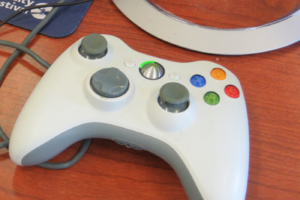 My colleagues and I recently published a review of research studies that used serious games to help kids and teens better manage their chronic illnesses. One of the most compelling findings was that the games and studies that encouraged some sort of interaction by a parent had more positive impacts than games that didn’t involve a parent.
My colleagues and I recently published a review of research studies that used serious games to help kids and teens better manage their chronic illnesses. One of the most compelling findings was that the games and studies that encouraged some sort of interaction by a parent had more positive impacts than games that didn’t involve a parent.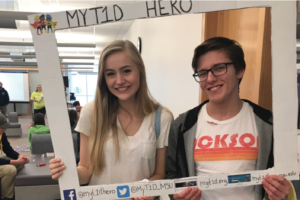
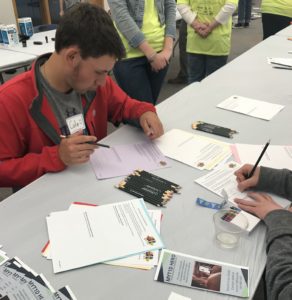



 As for me? I distinctly remember courageously nodding at my doctor and accepting my new challenges as they explained how I would have to change my diet, prick my finger multiple times a day, and give myself insulin shots regularly. Believe it or not the only thing that got to me was the idea of drinking diet pop… I hated diet pop. Maybe I was naive, but my diagnosis was a way to stand out from the crowd.
As for me? I distinctly remember courageously nodding at my doctor and accepting my new challenges as they explained how I would have to change my diet, prick my finger multiple times a day, and give myself insulin shots regularly. Believe it or not the only thing that got to me was the idea of drinking diet pop… I hated diet pop. Maybe I was naive, but my diagnosis was a way to stand out from the crowd.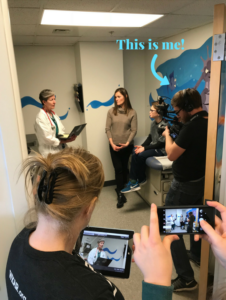

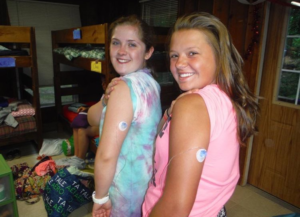 I don’t think any 16 year old girl would be thrilled with the idea. Before attending Camp Midicha, I was struggling with my diagnosis and going to camp was forcing me to acknowledge it. I cried the entire drive there and for an hour after my mom dropped me off. I was so nervous to be away.
I don’t think any 16 year old girl would be thrilled with the idea. Before attending Camp Midicha, I was struggling with my diagnosis and going to camp was forcing me to acknowledge it. I cried the entire drive there and for an hour after my mom dropped me off. I was so nervous to be away. The four of us are all facing difficulties that most teenagers do not have to deal with. They have become the closest friends I have ever had. We created an unbreakable bond, one that is difficult to put into words. I am so grateful for my other friends and family for their commitment to understanding my disease and all of the details, but there is something different about being with people just like me, who live this disease EVERY.DAY.
The four of us are all facing difficulties that most teenagers do not have to deal with. They have become the closest friends I have ever had. We created an unbreakable bond, one that is difficult to put into words. I am so grateful for my other friends and family for their commitment to understanding my disease and all of the details, but there is something different about being with people just like me, who live this disease EVERY.DAY.
